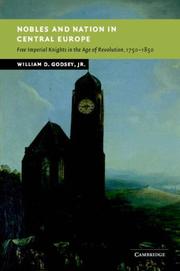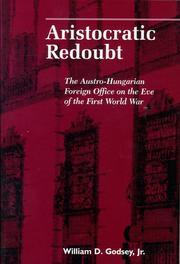| Listing 1 - 7 of 7 |
Sort by
|

ISBN: 0521836182 9780521123150 9780521836180 9780511496752 0511265336 9780511265334 9780511266058 0511266057 0511263783 9780511263781 0511264615 9780511264610 1280750065 9781280750069 110716138X 0511317689 0511496753 0521123151 9780511317682 Year: 2004 Volume: *7 Publisher: Cambridge ; New York Cambridge University Press
Abstract | Keywords | Export | Availability | Bookmark
 Loading...
Loading...Choose an application
- Reference Manager
- EndNote
- RefWorks (Direct export to RefWorks)
This is a study of Central European nobles in revolution. As one of Germany's richest, most insular and most autonomous nobilities, the Free Knights in Electoral Mainz represented the early modern noble ideal of pure bloodlines and cosmopolitan loyalties in the old society of orders. But this world came to an end with the outbreak of the revolutionary wars in 1792. Quite apart from the social, economic and political dislocations and loss, the era from 1789 to 1815 also meant a cultural reorientation for the nobility. William D. Godsey, Jr. here explores how nobles in post-revolutionary Germany gradually abandoned their old self-understanding and assimilated with the new cultural 'nation' while aristocrats in the Habsburg Empire, which had taken in many emigres from Mainz, moved instead towards supranationalism. This is a major contribution to debates about the relationship between identity, cultural nationalism, supranationalism and religion in Germany and the Habsburg Empire.
Caractéristiques nationales allemandes --- National characteristics [German ] --- Volkskarakter [Duits ] --- Nobility --- Nationalism --- National characteristics, German. --- Noblesse --- Nationalisme --- History --- History. --- Histoire --- Caractéristiques nationales allemandes --- National characteristics, German --- Noble class --- Noble families --- Nobles (Social class) --- Peerage --- Upper class --- Aristocracy (Social class) --- Titles of honor and nobility --- Consciousness, National --- Identity, National --- National consciousness --- National identity --- International relations --- Patriotism --- Political science --- Autonomy and independence movements --- Internationalism --- Political messianism --- German national characteristics --- Germany --- 18th century --- 19th century --- Arts and Humanities
Book
ISBN: 9780192537201 0192537202 9780191846793 0191846791 9780198809395 0198809395 Year: 2018 Publisher: Oxford Oxford University Press
Abstract | Keywords | Export | Availability | Bookmark
 Loading...
Loading...Choose an application
- Reference Manager
- EndNote
- RefWorks (Direct export to RefWorks)
The book traces the development of the central European Habsburg monarchy into one of early modern Europe's leading powers. In particular, it looks to the domestic foundations of that power, which were upheld by the growth of a permanent standing army.
HISTORY --- Austria & Hungary --- Habsburg, House of. --- 1600-1899. --- Austria --- Austria. --- History --- History, Military. --- Ao-ti-li --- Ostmark --- Alpen- und Donau-Reichsgaue --- al-Nimsā --- Ausztria --- Østrig --- Avusturya --- Österreich --- Avstrii︠a︡ --- Autriche (Republic) --- Rakousko --- Deutschösterreich --- German Austria --- Republik Österreich --- Austrian Republic --- Avstrija --- Republic of Austria --- オーストリア --- Ōsutoria --- אוסטריה --- Osṭriyah --- Austro-Hungarian Monarchy --- Holy Roman Empire

ISBN: 1557531404 Year: 1999 Publisher: West Lafayette Purdue university press
Abstract | Keywords | Export | Availability | Bookmark
 Loading...
Loading...Choose an application
- Reference Manager
- EndNote
- RefWorks (Direct export to RefWorks)
Aristocracy (Social class) --- Diplomatic and consular service, Austrian --- Diplomats --- Elite (Social sciences) --- Austro-Hungarian Monarchy. --- Austria --- Foreign relations
Book
ISBN: 9780197267349 0197267343 Year: 2022 Publisher: Oxford Oxford University Press
Abstract | Keywords | Export | Availability | Bookmark
 Loading...
Loading...Choose an application
- Reference Manager
- EndNote
- RefWorks (Direct export to RefWorks)
Habsburg, House of --- Austria --- History, Military. --- History --- 1519-1815 --- Autriche --- Austria. --- Histoire militaire. --- Histoire --- History of Europe --- anno 1600-1699 --- anno 1700-1799 --- anno 1800-1899
Book
ISBN: 9783795432997 3795432995 Year: 2019 Publisher: Regensburg Schnell & Steiner
Abstract | Keywords | Export | Availability | Bookmark
 Loading...
Loading...Choose an application
- Reference Manager
- EndNote
- RefWorks (Direct export to RefWorks)
Über Jahrhunderte hinweg pflegte die in mehreren west- und zentraleuropäischen Ländern reich begüterte Adelsfamilie Arenberg ein Naheverhältnis zum Haus Habsburg. Der Band untersucht die wechselseitigen Verbindungen dieser hochadeligen Familie mit der Habsburgermonarchie auf unterschiedlichen Ebenen und im internationalen Kontext. Die Adelsfamilie Arenberg besaß zahlreiche Güter in der Eifel, den Niederlanden, insbesondere den südlichen Niederlanden, später auch in Reichsitalien, und der Habsburgermonarchie sowie in Frankreich, Hannover und Preußen. Über Jahrhunderte stand sie in enger Beziehung zum Haus Habsburg. Der Fokus des Bandes richtet sich zum einen auf die Präsenz der Arenberg an den habsburgischen Höfen in Wien und Brüssel sowie im habsburgischen Militärdienst, zum anderen auf ihre Rolle in der Vermittlung habsburgischer Herrschaft vor allem in den Österreichischen Niederlanden. Dabei stellt sich die Frage nach Strategien der Macht- und Statusabsicherung sowie des Aufstiegs einer transterritorialen Familie, die lange in den Grenzregionen mehrerer Großreiche – neben der Habsburgermonarchie auch des Heiligen Römischen Reichs und Frankreichs – angesiedelt war. Darüber hinaus widmen sich einige Beiträge dem Leben und Werdegang von Arenberger Frauen, die in der Familienerinnerung weitgehend der Vergessenheit bzw. Diffamierung anheimfielen.
History of Europe --- Arenberg, d' [Dynasty] --- 929.5 ARENBERG --- 929.5 ARENBERG Genealogie--ARENBERG --- Genealogie--ARENBERG --- Aristocratie --- Histoire. --- Arenberg (famille d') --- Habsbourg (dynastie) --- Aristocracy (Social class) --- History --- Arenberg, House of. --- Habsburg, House of. --- Europe, Central --- Europe, Western --- Politics and government.
Book
ISBN: 9783702905507 9783486582499 3702905502 3486582496 Year: 2007 Volume: 49 Publisher: Wien Oldenbourg
Abstract | Keywords | Export | Availability | Bookmark
 Loading...
Loading...Choose an application
- Reference Manager
- EndNote
- RefWorks (Direct export to RefWorks)
History of Germany and Austria --- Habsburg [Dynasty] --- anno 1700-1799 --- anno 1800-1899 --- anno 1600-1699 --- Finance, Public --- Estates (Social orders) --- Finances publiques --- Etats (Couches sociales) --- History --- Congresses. --- Congresses --- Histoire --- Congrès --- Habsburg, House of --- Holy Roman Empire --- Saint Empire romain germanique --- Congrès
Multi

ISBN: 9781789208788 9781789208771 Year: 2021 Publisher: New York; ; Oxford Berghahn Books
Abstract | Keywords | Export | Availability | Bookmark
 Loading...
Loading...Choose an application
- Reference Manager
- EndNote
- RefWorks (Direct export to RefWorks)
"Across the medieval and early modern eras, new rulers were celebrated with increasingly elaborate coronations and inaugurations that symbolically conferred legitimacy and political power upon them. Many historians have considered rituals like these as irrelevant to understanding modern governance-an idea that this volume challenges through illuminating case studies focused on the eighteenth- and nineteenth-century Habsburg lands. Taking the formal elasticity of these events as the key to their lasting relevance, the contributors explore important questions around their political, legal, social, and cultural significance and their curious persistence as a historical phenomenon over time"--
History --- Coronations --- Austria --- Kings and rulers.
| Listing 1 - 7 of 7 |
Sort by
|

 Search
Search Feedback
Feedback About UniCat
About UniCat  Help
Help News
News